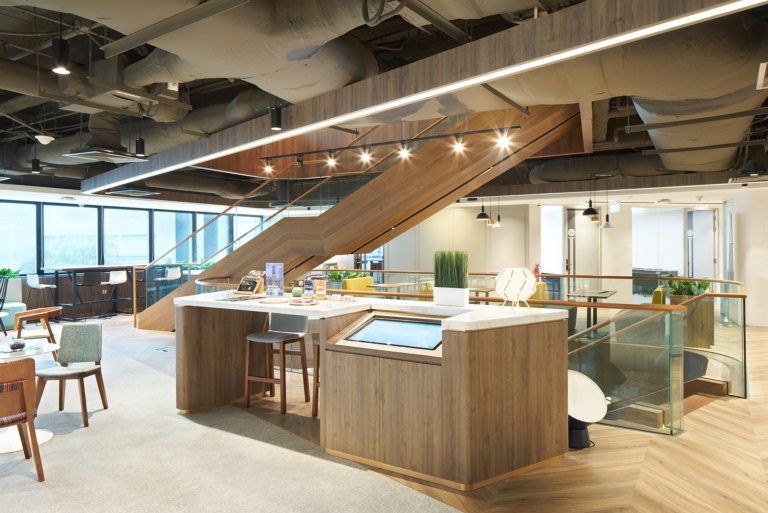
Small businesses, freelancers, and remote employees can use coworking spaces to get work done, network, and participate in their local business community.
Coworking spaces, which were a relatively unknown concept ten years ago, have altered the way the modern worker interacts with the business world. There are about 17,000 coworking spaces in the globe today, so understanding the advantages of using one is critical to your company’s success.
Corporate employees turn to shared office spaces for the same reasons that individuals do. An article published by Sloan MIT Review seems to agree.
According to the article, 84% of businesses prefer this work environment because it allows for more human engagement. 82%, on the other hand, see it as a source of new ideas and opportunity. 77% of businesses also find the knowledge-sharing in this type of office space to be beneficial to the company.
As a result, there isn’t a single employee who doesn’t enjoy working in a non-corporate setting. Think about it. You receive all the benefits of an office with the added benefit of a more flexible workspace. It’s why some of the industry’s greatest names are eyeing coworking spaces, which are rightfully dubbed the “workplaces of the future.”
Here are the eight most convincing reasons to operate in a flexible office space for business owners thinking about making the switch.
1. Time is Money

Shared office spaces are ideal for lean and agile enterprises, such as fast-paced design and technology firms. These businesses benefit directly from the flexibility of shared offices’ ability to save time and money. Shared office spaces are extremely quick and simple to set up, especially since all of the necessary amenities and furnishings are already in place before the move.
Inversely, the same idea applies. If your company outgrows its current location, it’s just as simple to vacate it for the same reason. When compared to standard office leases, flexible office spaces are a more cost-effective use of your resources.
2. A Great Location for Far-Flung Teams
The gig economy is well known for driving the expansion of coworking spaces. Surprisingly, it had an influence on conglomerates as well. Many businesses are no longer requiring staff to work from their headquarters. They are pleased with the employee’s decision to work from a coworking space. Why is this the case? Because it allows for the recruitment of people from all around the world.
3. The Space Grows With You
Another advantage of flexible office spaces is that you only pay for the space your company requires at any one moment. Instead of leasing a complete facility that may end up being just partially occupied, if your company only has five employees, you only need five desks.
The flexibility of flexible offices in this area is crucial in distinguishing them from standard office spaces. Flexible offices are pushing a shift towards higher cost-efficiency, while firms historically struggled to get the most out of their resources in terms of space. You may simply rent extra workstations as your company expands, and your office space will expand naturally.
4. Ready for Occupancy

Serviced offices, as its name implies, are frequently fully serviced, allowing firms to concentrate on their core business rather than bothering about setting up utilities, arranging security, or sourcing equipment or facilities.
There is a wide range of services accessible. Businesses may anticipate everything from utilities and office maintenance to a fully staffed reception, additional furniture, 24/7 security, cleaning services, and much more as part of an all-inclusive monthly payment.
As a result, organizations may take advantage of every high-quality facility imaginable without incurring the full cost of providing these services themselves, such as hiring more workers. Instead, serviced offices ensure that everything you require is already in place, giving you more time to focus on your core competencies.
5. Prime Location

Real estate in traditional cities is both expensive and difficult to get by. Flexible office spaces, on the other hand, are available and frequently placed in the center of desirable business areas.
Given the time and money required to lease a dedicated office in a major hotspot, choosing a shared office space in a desirable location can frequently prove to be far more cost-effective. Shared office spaces are helping to bring desirable commercial locations within reach of firms with fewer resources because the cost of the office will be shared by numerous enterprises at the same time.
6. Networking with Like-Minded Individuals and Businesses
Private, shared, managed, or coworking spaces are all examples of flexible workplaces. The latter sort of office space frequently involves sharing space with other people and enterprises. As a result, like-minded businesses and individuals can align their aims and join together to discuss their ideas, leading to beneficial collaborations.
Unlike typical offices, those working in design, digital, and technology are frequently seen using a shared office. One of the most appealing advantages connected with a flexible office is the proximity of these influences, which can act as a genuine boost to your business activities. If your company would rather have its own office, flexible offices may accommodate that as well.
Shared spaces, which naturally attract freelancers and startups, are similar to laboratories where creativity, innovation, and new methods of working are nurtured. It’s why many companies are electing to have teams operate out of shared workspaces in order to foster a more open, tolerant, and growth-oriented working culture.
7. Impress your Partners/Stakeholders
Shared office spaces in big cities are frequently furnished to a high standard. This entails high-end, contemporary furniture, tastefully decorated offices, and architecturally spectacular features. As a result, flexible offices create an immensely appealing working environment, boosting employee motivation and satisfaction.
However, the benefits of these facilities aren’t restricted to your personnel. Shared offices’ first-rate amenities can also act as a wonderful reflection of your company to customers, clients, and investors, allowing you to make the lasting impression you want.
8. Venturing into New Markets
Flexible offices are quickly becoming a standard in today’s commercial real estate market. New flexible office spaces are opening every day in cities throughout the world, including New York, Amsterdam, Hong Kong, Berlin, Mumbai, Kuala Lumpur, and Melbourne, and their availability is increasing significantly.
As a result of this advancement, establishing a new overseas office is now easier and more cost-effective than ever before, allowing your company to enter previously unexplored markets.
What’s the Next Step?
As you can see, shared offices have numerous advantages for businesses of all sizes and sorts. Whether you’re a freelancer or the CEO of a huge corporation, co-working spaces provide cost and scale flexibility, as well as staff networking opportunities.
Is a shared workspace a good fit for your business? Only you can answer that question, but we hope this article has assisted you in identifying some of the advantages of using shared office spaces.

Enterprise software development experience. More recently in positions including CTO, Lead Developer and Head of Product in Australia. Deep expertise in property and legal technology in Australia with a specialty in lead generation and tech scalability across Asia-Pacific.